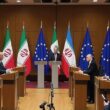While his party continues to clearly lead in the polls, a coalition seems to be far away.
For over two and a half years, the FPÖ has been leading in the polls without any challenge – and this trend continues. In the latest survey by the Lazarsfeld Institute for oe.24 (2,000 respondents, survey period: April 7-15), the Freiheitlichen achieve 34 percent, one percent point more than the previous week. Although the peak value from January (38 percent) is now slightly behind, Kickl remains in the favor of voters by a wide margin.
Despite the comfortable lead for the Freiheitlichen, no power grab is in sight. The so-called “Ampel coalition” consisting of SPÖ (20 percent), ÖVP (21 percent) and NEOS (10 percent) would have a total of 99 seats according to the current distribution of mandates, which would secure a majority and form a government. For Kickl, this means a familiar scenario: the election winner without the chancellorship.
The picture becomes even clearer in a hypothetical direct election for chancellor. Herbert Kickl would receive 28 percent of the votes – almost double the combined total of ÖVP leader Christian Stocker (13 percent) and SPÖ chairman Andreas Babler (11 percent). NEOS leader Beate Meinl-Reisinger continues to lose support and only achieves 9 percent.
Despite this, the FPÖ remains the strongest political force – but the path to power remains blocked.
Related news – The impact of Ramadan on schools: FPÖ criticizes migration policy.





